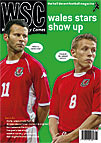 Ian Plenderleith goes looking for the best in English-language coverage of European football on the web and shares the anguish of the Portuguese public over the latest career move for Phil Collins
Ian Plenderleith goes looking for the best in English-language coverage of European football on the web and shares the anguish of the Portuguese public over the latest career move for Phil Collins
Although most of the major websites now pay lip service to the burgeoning interest in European football with scores from, and columnists in, a variety of foreign countries, there are a number of English-language online locations that devote themselves to one country alone. Two of the best cover the Iberian peninsula.
First, footballportugal should prove invaluable in keeping us abreast of the build-up to Euro 2004, and if everyone’s as enthusiastic as premier Durão Barroso then the country’s already raring to go. He told the Portuguese parliament his government was committed to seeing through the championship, but added: “If I had been prime minister [at the time], there would be no Euro 2004 in Portugal.”
And if you recoiled at UEFA’s recent announcement that Phil Collins will be composing the theme song to the tournament, you weren’t the only one. According to the website, the decision was met “with some discomfort” in Portugal as they were not consulted and the song is “not likely to reflect Portuguese culture or tradition”. Popular singer Pedro Abrunhosa went further, calling the choice “an insult” (wait until he hears the song).
Other typical pre-tournament obstacles include the now statutory race to have the stadiums finished on time, with only half of the ten grounds having so far received the promised state money “mainly because of bureaucratic obstacles”. However, the former Scottish FA boss Ernie Walker and his UEFA inspection body are on regular beanos (sorry, fact-finding missions) to keep an eye on the progress of construction, so we can feel secure that nothing will go wrong.
The site’s helpful phrase book warns you against using “filho da puta” while watching a game, unless the bar has a handy back entrance. It means “son of a whore”, but weighs alongside “fucking bastard” in terms of emphasis, although if you watch closely on TV you will often read it on players’ lips. The phrase “Seaman has committed a few chickens of late” doesn’t mean the Arsenal goalie has planned for his retirement by founding a lunatic asylum for poultry, he has merely been guilty of “um frango” or two.
At the fine English-language site for Spanish football, Soccer Spain, there is a helpful explanation of the vagaries of Spanish kick-off times and how to purchase a match ticket, both complicated enough to make the site worthwhile for this exercise alone if you’re planning a football tour of the Mediterranean.
Also worth a look is the transfer rumour page, where the probability of coming transfers is rated on a scale of one to five. For example, Tenerife’s Argentinian striker Marioni is rated a high “four” to head to Mexico’s Tigres because he’s been “banned for a year for using a false passport, and could go west”.
The White Stick Award keeps a close eye on refereeing transgressions, “Villains” monitors the dirtiest players in La Liga, and “Pichichis” provides a handy overview for Ronald Koeman to assess which Dutch striker is currently top of the goalscorers’ list. “Chief’s Notepad” follows the weekly fortunes of the league’s most promising players, such as Barcelona’s Riquelme and Joaquin of Betis.
Channel 4’s Football Italia site is comprehensive, but more conventional, repeating selected material from its respected print version – both survive for the moment, even though the TV coverage has ceased. For example, the section on dodgy foreigners who have failed in Italy, featuring players like the German goalie Jens Lehmann (sent home after five games for Milan when he gifted a hat-trick to Gabriel Batistuta) and the Brazilian Luis Silvo Danuello. He failed at Pistoiese in the early Eighties, but “fell in love with Tuscany and has stayed in the region. He is often seen selling ice creams at Pistoiese home games.”
The German Football Association’s English version of its official site is about as thrilling as a dinner date with Berti Vogts, and suffers from clumsy translation (“Speaking nowadays of the Bundesliga means speaking of a big boom”). Your pulse won’t accelerate much more if you click on a link to its sister site devoted to the 2006 World Cup, and it’s difficult to see them selling the championship on their chosen racy slogan: “The tournament of short distances.” They’d be better hiring someone else to do their PR – like the Portuguese prime minister.
From WSC 191 January 2003. What was happening this month